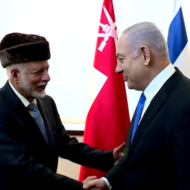
Israel’s prime minister says he plans on working with Arab countries at a U.S.-backed Mideast conference in Warsaw to focus on the “common interest” of combating the Iranian threat.
By: Associated Press and United with Israel Staff
Israeli Prime Minister Benjamin Netanyahu received a warm welcome from Oman’s foreign minister, Yusuf bin Alawi, at a major Mideast conference in Poland that started Wednesday.
The summit provides Netanyahu an opportunity to showcase Israel’s improved relations with Gulf Arab nations.
Several Gulf dignitaries are expected to attend in a potential show of force against uninvited Iran, with the Palestinians urging a boycott of the conference.
The United States and Poland are sponsoring the conference in Warsaw, which is officially aimed at promoting peace and security in Mideast, but appears to be focused on isolating Iran.
Iran has denounced the gathering as an American anti-Iran “circus.” Russia has said it will not attend, and the European Union’s foreign policy chief, Federica Mogherini, is also skipping the event.
For the Trump administration, it is a high-profile occasion to gather all its Middle East allies. For Poland, it offers a chance to strengthen ties with Washington as it seeks greater protection from Russia.
But the real winner could be Netanyahu, who has repeatedly stated that Israel has clandestinely developed good relations with several Arab states, despite a lack of official ties. Bringing such contacts out into the open marks a major diplomatic coup, putting a seal of approval on his goal of improving Israel’s standing in the world.
‘A New Era’
Netanyahu’s office released a video Wednesday showing him meeting Oman’s foreign minister, Yusuf bin Alawi. Netanyahu, who visited Oman last October, called the invitation to the Gulf state “courageous” and said “many” countries are following Oman’s lead, hinting that additional meetings would take place during the conference.
Bin Alawi said people in the Middle East have “suffered a lot” because they stick to the past and said Wednesday’s meeting reflected a “new era.”
Netanyahu added, “The courageous decision of Sultan Qaboos to invite me to Oman is changing the world. It’s pointing the way for many others to do what you said, not to be stuck in the past, but to seize the future. Many are following this lead, and may I say, including in this conference.”
He continued, “I thank you for this positive policy that can lead to peace and prosperity for all. I want to thank you on behalf of the people of Israel, and I allow myself to say on behalf of many people in the Middle East.”
Before departing for Poland, Netanyahu told reporters on Tuesday the focus of the conference will be Iran, an issue he said “unites Israel, the United States, many countries in the world.”
Danny Danon, Israel’s U.N. ambassador, said his private contacts with Arab officials are far warmer than what is said in public.
“As of now, they are already cooperating with us,” he told reporters in Jerusalem recently. “We ask them to recognize us and not to be ashamed for using our technology or our defense systems.”
Israel has signed peace accords with Egypt and Jordan and ties that have long lingered in the shadows with other Arab nations have begun to emerge, as shared concerns about Iran have overshadowed the Palestinian issue in recent years.
Days after Netanyahu’s visit to Oman, two of his Cabinet ministers headed to the United Arab Emirates last fall for a security conference and to cheer on an Israeli delegation at a judo tournament — where the Israeli anthem was played after an Israeli competitor won gold.
Backdoor Ties
Saudi Arabia, long rumored to have backdoor ties to Israel, lifted a decades-long ban on the use of its airspace for flights to Israel last spring. The leaders of the small Gulf nation of Bahrain have also expressed willingness to normalize relations.
Gulf Arab states have given less voice to their traditional antipathy toward Israel as they have grown increasingly fearful of Iran over its involvement in various regional conflicts and its support for various armed terror groups. Getting closer to Israel also helps them to curry favor in Washington.
The foreign ministers of Saudi Arabia and the UAE are also scheduled to attend and meet with U.S. Secretary of State Mike Pompeo. It is unclear what their level of engagement will be with the Israeli delegation.
Netanyahu recently visited the Muslim-majority African nation of Chad to officially restore relations after 50 years and promised there would be more such visits and announcements soon.
Subscribe to Our FREE Newsletter for More Great Stories Like This One
United with Israel publishes stories like this every day. We believe that our work allows a more balanced view of Israel to emerge. With so much anti-Israel media bias out there from outlets like CNN and the BBC, helping the Holy Land means getting our message out to as many people as possible.
You can help.
Subscribe to our free newsletter to ensure that you get the latest and best stories from United with Israel. Together we can make a difference, and it starts with communication.
CLICK HERE TO SUBSCRIBE TO OUR FREE NEWSLETTER
Source: United with Israel

